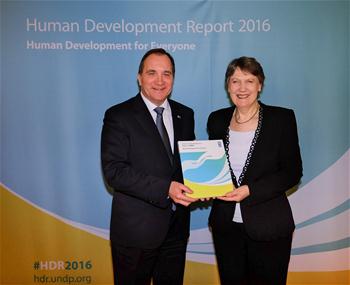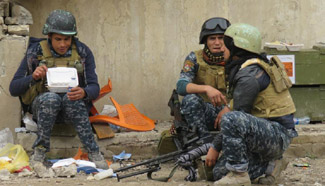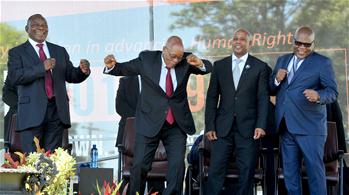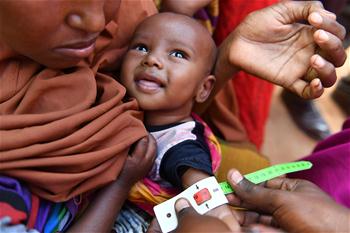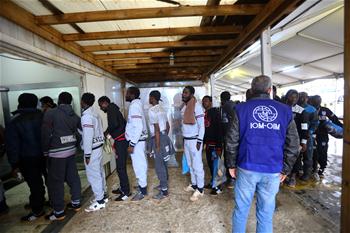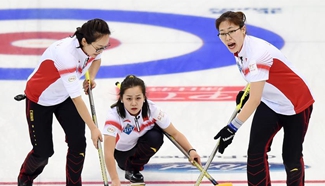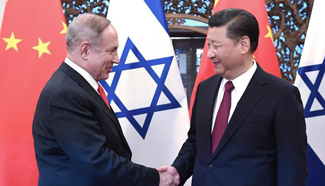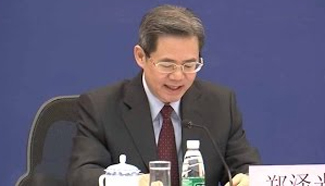SCHLADMING, Austria, March 21 (Xinhua) -- The Special Olympics sports organization continues to provide an important bridge in giving people with an intellectual disabilities the means to find a positive path through life, Chairman of the Special Olympics Timothy Shriver said.
The skills participants learn are valuable in areas of their life outside of sport too, Shriver told Xinhua in an interview on Sunday in the central Austrian city of Schladming, where the Special Olympics World Winter Games are being held.
In being part of a sports organization, he said they learn teamwork and communication skills, the confidence to work in a group, as well as grit and perseverance.
"This is not just training for sport, but training for employment, training for community participation, and I dare say, even training for life," Shriver said.
Participants become more likely to get a job and can also attain greater independence, such as the ability to live alone, have an apartment, take a bus, and on the whole to become more socially included, he said.
Health is also an important aspect of the activities of the Special Olympics, encouraging participants to see a doctor, have a physical test, and engage in sports to develop their fitness.
The treatment of persons with disabilities has come a long way since the Special Olympics organization was first formed in 1968. Shriver said such individuals were in the past treated with abuse and neglect in large institutions, and were also segregated in the education system.
Children were previously told they could not attend school but are now doing so. Doctors who would previously have negative reactions are now providing positive care, and life expectancies are also on the increase.
In Shriver's opinion, however, the changing of certain attitudes in society still has some way to go.
People still look at someone with Down syndrome or autism and think "hopeless" or "tragedy", which he said are wrong opinions.
In addition, people feel a sense of sadness when seeing others with a disability. Again, he says this is "wrong".
These attitudes need to change all across society, he argued, from the community, the school, daycare centres, hospitals and even the delivery room.
"We want pediatricians and obstetricians to tell a mother and father who have had a baby with down syndrome, and "you should be proud of your child," he added.
The child can grow up to become a Special Olympics athlete one day, to have a job, wonderful friends, to ride a bicycle, to contribute to their families, and "make you fall in love."
All people have gifts and abilities, and these must be highlighted, he argued. A message of strength and of value should be presented to a world that is still learning and trying to understand what intellectual disabilities are about.
The Special Olympics movement is trying to achieve this in individual athletes, schools, families, daycare centres, and sports clubs.
Their efforts are ideally seen in local news outlets at the local level, so that communities can be further educated. Families can also come along, and be proud of the athletes.
Shriver said it is his hope that, as the efforts continue, one day they will "catch fire", and the average person will say they have seen the Special Olympics movement, at their school, town, and community, and say, "I see people with intellectual disabilities as people of value too."
This is part of the efforts of the organization's program in China, where Shriver said he has now been actively travelling for over 20 years as part of his role.
He said leadership and support from China's governing Party has been strong, and that the Special Olympics has since developed strong friendships and mutual respect in the most populous country in the world, that has now grown to reach 1.2 million Chinese athletes participating in the games.
This extends to almost every province in the country, where the thousands of events held year-round provide a testament to the "Chinese spirit", and a "welcoming attitude toward people with intellectual disabilities."
Shriver stated his wish for people both with and without intellectual disabilities to play sports together in a "unified revolution", something he also wished to see happen in the program in China, that he said could set the country apart as a "leader in the evolving hopes and dreams of people with intellectual disabilities all over the world."
In a country the size of China, spreading the message is a challenge, he acknowledged, but reiterated the positive support received from Special Olympics China, the central government, and other organizations.
Shriver said the message of his organization must nonetheless continue to be pushed forward.
The increased use of digital tools such as the messaging application Wechat is needed, and can be used to "talk with mothers and fathers to send them messages of positivity and engagement."
Funding is also an area that could see improvement. As things stand now, the main Olympic teams, regular sports teams such as those in basketball or football, and even the Paralympic community receive far greater funding than the Special Olympics.
This is true across the world, Shriver said, with money always tending to go toward those at the elite level.
Here his organization hopes to have more investment across the board, from the private sector, government, individual donors, and corporate foundations, so that the Special Olympics program can continue to become stronger at the grassroots level.
As the Special Olympics prepares to celebrate its 50 anniversary next year, Shriver said it will be a good time to see how far the organization has come.
One hundred thousand events are now held across the globe annually, and he said he hopes to see it grow to even greater heights in the 50 years that are to come, not just for people with intellectual disabilities, but for "all of us".
This will bring with it the ability to learn compassion, empathy, resilience, and "real strength that comes from within".
But more importantly, in Shriver's view, it will bring unity, particularly in a world that is presently looking for ways to find it.
"In the next 50 years I believe it will be the athletes of Special Olympics who through sport will show the world how to unite, and change the game," he said.

